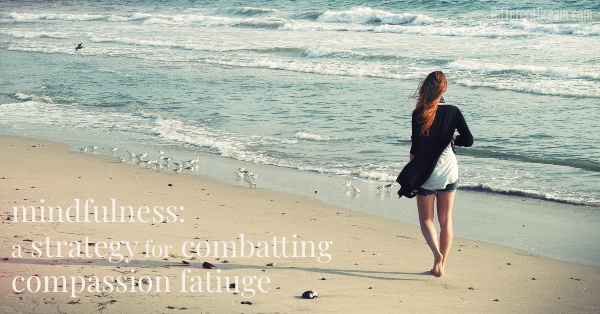Combatting Compassion Fatigue: Easy and Effective Strategies, Part 1

Combatting compassion fatigue can be a challenge for parents caring for children with significant disabilities and special needs. Jessica Temple, a clinical neuropsychologist and mom of two children with special needs faces that challenge, too. Today she begins a 3 part series full of practical ways to deal with compassion fatigue.
Combatting compassion fatigue, a beast that rears its ugly head rather when one must care for children with special needs 24/7, is essential for caregivers. Compassion fatigue is defined as the severe strain and stress of regularly caring for others, especially those who have chronic physical or mental conditions. Our intense service can take a huge toll on caregivers like us. So how do we combat compassion fatigue? How can we minimize its impact on us and stop it from returning?
We all know that self-care is helpful and important. However we don’t always have the time or money to use the tools we’ve found work for us. This is where the strategies of Dialectical Behavior Therapy (DBT) come into play. DBT therapy was developed to help individuals manage painful emotions and decrease conflict in relationships. But you don’t have to enter psychotherapy to learn or use it/ You can do it from your home by using 3 DBT strategies known as mindfulness, IMPROVE, and self-soothe. Part 1 in this series takes a deep dive into mindfulness.
Combatting compassion fatigue starts by implementing a strategy called mindfulness. It is defined as awareness of our environment, bodily sensations, thoughts, and feelings while accepting that we are experiencing whatever we are experiencing in the present moment.
This doesn’t mean we have to like what is going on, but that it is actually going on. Then we need to accept that our thoughts or experiences exist without having to judge them. This helps us to be in the here and now, while also being kind to ourselves.
Mindfulness helps us to gently remove our minds from the past (trauma or upsetting experiences we have had) and the future (our worries and concerns) and to stay in the moment. In the present, things can be either be very hard or quite calm for a short time.
Here are some easy starting points for mindfulness:
- Fully experience your food. What does it feel like in your mouth? What does it taste like? How does it smell? What does it look like on the plate?
- Being mindful of how your body feels. Pay attention to how your feet and legs feel when you walk or how your rear end and legs feel when you sit in a chair.
- Be aware of your breath. How does it feel in your nose and throat? How does your chest feel as your lungs inflate?
- Focus. Spend a minute think about a short saying or mantra.
Once you get a feel for mindfulness, all of the following suggestions will have a much stronger impact on your well being.
Keep in mind that this is a skill that requires practice and will not be perfected overnight. Be patient with and kind to yourself. As they say, the only wrong way to practice mindfulness is to not do it at all.
Combatting Compassion Fatigue: Part 2
Combatting Compassion Fatigue: Part 3
Do you like what you see at DifferentDream.com? You can receive more great content by subscribing to the monthly Different Dream newsletter and signing up for the daily RSS feed delivered to your email inbox. You can sign up for the first in the pop up box and the second at the bottom of this page.

By Jessica Temple
Jessica Temple, PsyD, ABPP-CN, is a board-certified adult clinical neuropsychologist. She has two children who have special needs. She and her husband, Lewis, host a podcast called Thriving in The Midst of Chaos, where they talk about all aspects of special needs including getting a diagnosis and treatment, self-care, relationships, transitioning to adulthood, school, and finances. They created Thriving in The Midst of Chaos to offer support to others in the special needs world as well as to provide an easy way to find the most useful resources. They aim to share helpful resources with others, advocate for improvement, change in the special needs world, and offer a different perspective on parenting. To find out more about how Jessica’s work can help you, contact her at fubarpod@gmail.com or @midstofchaospod on all social media platforms.
1 Comment
Submit a Comment
Related Posts
How to Connect with Other Special Needs Parents
Guest blogger Kristin Faith Evans explains how to connect with other special needs parents to get the support you need.
Flying Near the Sun as a Special Needs Parent
Guest blogger Lisa Pelissier explains how she copes when she is flying near the sun as a special needs parent.
We Are FOR Parents and Children
Guest blogger Heather Braucher explains how as special needs parents, we are FOR parents and children just like God is FOR us.






Practical and uplifting! I always struggle with mindfulness but never even considered the problem of compassion fatigue!